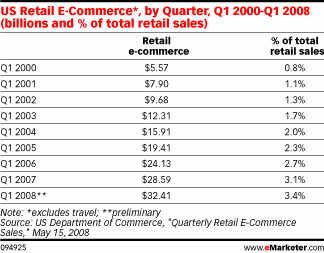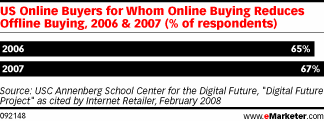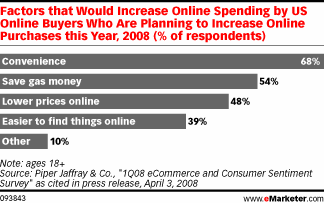"This shows that the economic slowdown is having more of an effect than people suspected," said Jeffrey Grau, senior analyst at eMarketer. "It's accelerating existing trends."

Mr. Grau said that retail e-commerce sales growth would have slowed even without any concern about the economy. Since 2003, the real engine of e-commerce growth has come from increased sales to existing online buyers rather than new buyers.
E-commerce sales growth is still higher than overall retail sales growth, which has been 6% at most over the past five to six years. In contrast, retail e-commerce sales growth has been about 25% or more during the same time.
One reason for slowed overall retail sales growth is that existing online buyers are doing more of their buying on the Internet instead of in stores, according to USC Annenberg School Center for the Digital Future data. The organization reported that not only did large percentages of consumers say their online buying led to decreased offline buying, but that the number is growing.

This shift to online buying is happening because consumers have become more confident shopping on the Internet, which has also improved satisfaction levels. Additionally, merchants have figured things out operationally as far as product information, stock and delivery.
Although the economic slowdown is affecting retail e-commerce sales as well as retail sales overall, Mr. Grau said that online stores likely will fare better than brick-and-mortar ones—partly because of the downturn.
"Some people may shift their spending online to save on gas and because they think they can get a better deal," Mr. Grau said.






